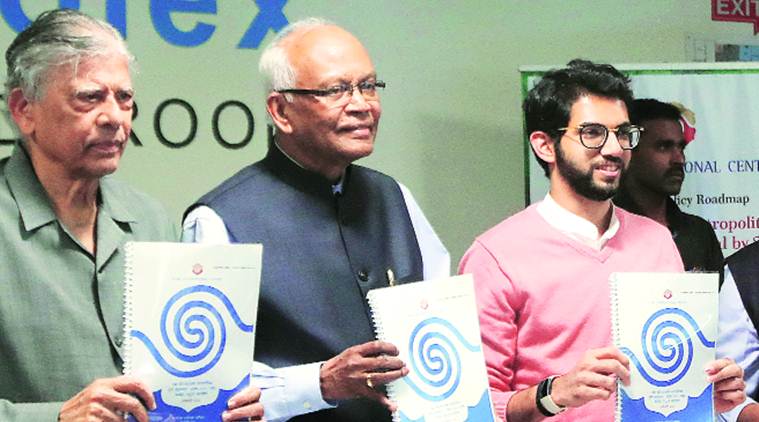Work will be suspended wherever it has negative impact on environment: Aaditya Thackeray
The committee, appointed by Chief Minister Uddhav Thackeray in December, stated that it had found no viable alternative location for the car shed.
 State Environment Minister Aaditya Thackeray releases the Pune International Centre’s Policy Paper — ‘Making Pune Metropolitan Region Carbon Neutral by 2030’, with Raghunath Mashelkar and Vijay Kelkar of PIC. (Express photo: Ashish Kale)
State Environment Minister Aaditya Thackeray releases the Pune International Centre’s Policy Paper — ‘Making Pune Metropolitan Region Carbon Neutral by 2030’, with Raghunath Mashelkar and Vijay Kelkar of PIC. (Express photo: Ashish Kale)
State Environment Minister Aaditya Thackeray on Wednesday didn’t give a direct reply when asked about an expert committee’s recommendation to lift the stay on the construction of a Metro rail car shed in Mumbai’s Aarey Milk Colony.
The committee, appointed by Chief Minister Uddhav Thackeray in December, stated that it had found no viable alternative location for the car shed.
Aaditya, who was in Pune on Wednesday to attend an event, said, “Metro rail work in Mumbai has not been stopped anywhere. However, work will be suspended wherever it has a negative impact on the environment. The ground reality needs to be seen before raising the issue. The work is going on”.
Earlier, Aaditya had opposed the decision, taken by the erstwhile BJP-Shiv Sena alliance government, to chop thousands of trees at Aarey colony to set up the Metro car shed. The move had also been opposed by several environmentalists and activists.
At the event in Pune, Aaditya said the new alliance government of Shiv Sena, NCP and Congress would be sensitive towards environment-related issues.
The Thackeray family scion said he wanted to take up the responsibility of handling the environment and tourism departments in the state cabinet because these were till now considered “side departments”. “I consider the Environment department as the department of future as it impacts the future of the state,” he said.
He said political parties promise WiFi hotspots to citizens during elections, but “I don’t want a situation in the future when political parties will have to promise oxygen hotspots for citizens.”
Aaditya also said he was exploring the possibility of setting up renewable energy projects alongside the Pune-Mumbai and Mumbai-Nagpur highways. He said the concerned department has been asked to plan a project to collect rainwater, as these highways received a lot of rain.
Earlier, he released the Pune International Centre’s Policy Paper — ‘Making Pune Metropolitan Region (PMR) Carbon Neutral by 2030: A Policy Roadmap’ — authored by Professor Amitav Mallik. The session was chaired by Dr Raghunath Mashelkar, president of PIC.
The policy roadmap recommended energy-efficient steps such as aiming to reduce consumption by 25-30 per cent, generation of 70-80 per cent power through renewable energy sources, reducing use of petroleum-driven vehicles and promoting electric vehicles, encouraging modular green townships and a people’s movement towards a low-carbon footprint lifestyle.






